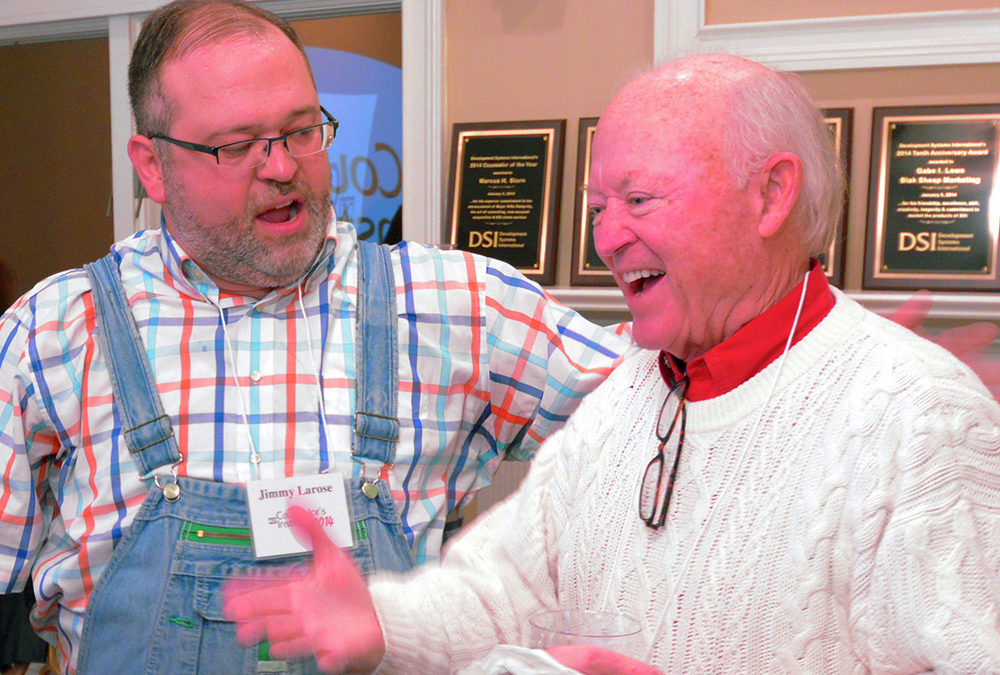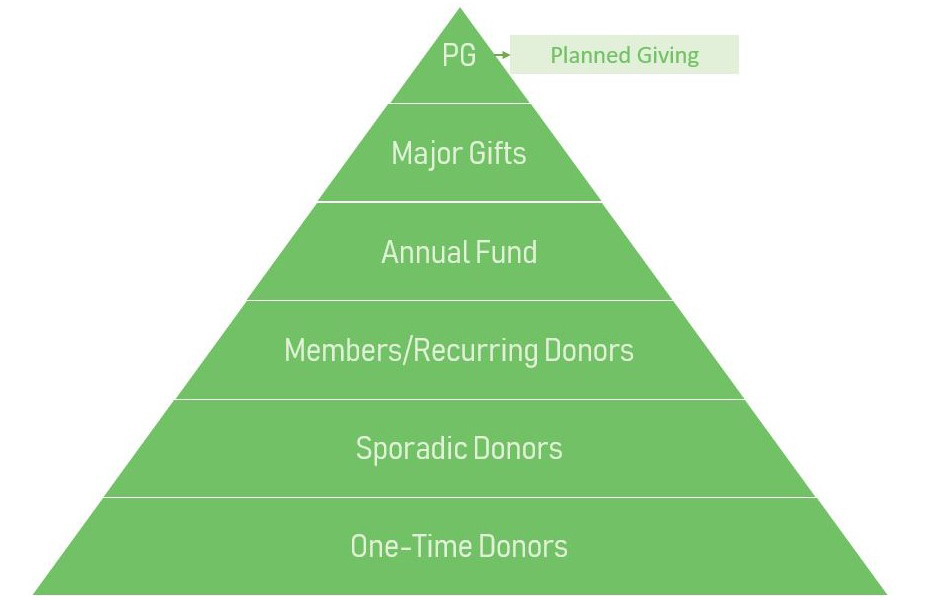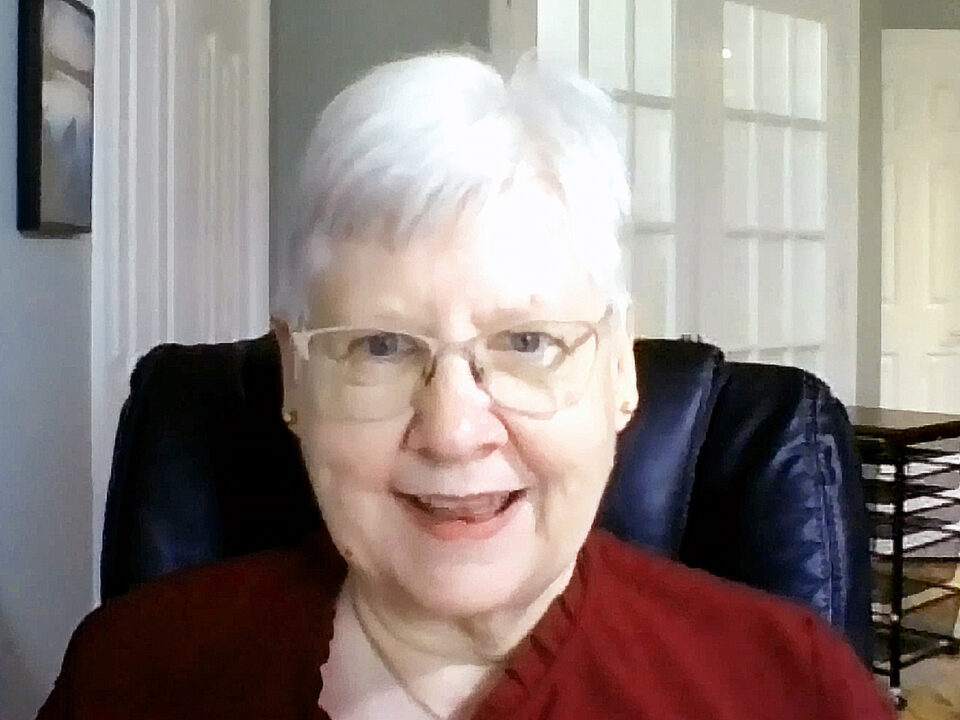
Hall Powell says, when we gather a group of nonprofit staff members and their organization’s volunteer leaders together to discuss Major Gifts Ramp Up (MGRU), we do so knowing that our audience may be made up of various types and sizes of NPOs. Some may be brand new and others older, larger and more experienced, sophisticated organizations with all others in-between the two bookends. With that in mind, what is a major gift?
Obviously defining a “major gift” depends on the philanthropic need of the organization. For one organization a major gift might be $500.00 and for another, e.g., an institution of higher education or a major national nonprofit like The Red Cross, might be described as any gift larger than $100,000.00. So, in explaining and defining “Major Gifts,” we must be sure that our conference attendees understand that major gifts are a “major” component of a comprehensive fundraising program. Your organization may have a comprehensive fundraising program as illustrated in the graphic below, but for those organizations that don’t, Major Gifts Ramp Up will set you on a course for developing an ongoing sustainable, comprehensive fundraising program for your nonprofit organization.
Let’s review the Pyramid of Giving briefly:

The first four levels of the the pyramid presume an already base of existing donors. If your organization does not have this foundation, Major Gifts Ramp-Up will generate initial smaller gifts MADE BY MAJOR GIFTS DONORS. Next, you see typical fundraising supported by annual gifts derived from many strategies designed to attract annual gifts e.g., special events, online giving, direct mail and many other creative ways of drawing attention to your organization’s mission resulting in individuals, businesses, and foundations making annual contributions. While this foundation of donor support is important for many reasons, especially providing the opportunities to cultivate and identify potential donors for the next level of giving (major), it is the least cost-effective method of fundraising. More about that later.
Major Gifts are usually generated from cultivation of relationships with annual support donors resulting in earning the right to ask for major gifts over-and-above their annual giving. In addition to “mining the gold” among annual donors, ongoing activities to identify and qualify potential major gifts prospects is an ongoing fundraising (development) activity. MGRU, properly implemented does both (more about that later).
Ultimate Gifts are the planned gifts, typically included in someone’s will (or other legal documents or the gift or transfers of assets to a nonprofit organization. Developing good relationships with donors provides opportunities for seeking the ultimate gift.
More! Well…what about “more about that later?” Here it is: An effective, sustainable fundraising program includes annual, major and ultimate gifts. Many nonprofits get stuck in the base level of annual gifts, depending on special events, grants (government and private foundations), fee for services, internet giving (minor part usually), direct mail, etc., and never enter into major gifts fundraising, thereby denying their organizations the unlimited amounts of philanthropic support that is available to them.
I mentioned that special event fundraising is the least cost-effective method of all fundraising strategies. The professional/industry standard is that the ROI (return on investment) for special events is 50%. Fifty percent! That is considered good. Whereby the cost of fundraising for major gifts is 10% or less, resulting in an ROI of more than 90%! Typically, the time spent on conducting a special event e.g., as a golf tournament (“Everybody is doing it”) could result in an individual(s) gift(s) of many times more that what will be realized from a special event. Special events definitely have their place in a good, comprehensive fundraising program, but the most effective ones are usually “signature events” that not only produce good financial returns but also continue to cultivate current and future major gifts donors. The Major Gifts Ramp Up model offers the best way to maximize the efforts of time and staff effort to conduct a signature event.
Major Gifts Ramp-Up could be the catalyst for introducing a comprehensive, ongoing fundraising program for your organization, or for the more mature, sophisticated organization with an established development (fundraising) program, MGRU can enhance your existing program with tools and methodology that you are not using now.
It’s time the take another look at “how to do fundraising.” Major Gifts Ramp-Up “reimagines” philanthropy.
VISIT HERE FOR MORE BIG IDEAS ABOUT COMPREHENSIVE FUNDRAISING CAMPAIGN
Hall Powell Says, “Launch a Comprehensive Fundraising Campaign” was written by Hall Powell who has served as Senior Vice President of Development Systems International (DSI) for more than a decade and has 34 years of fundraising experience, including 19 as a fundraising consultant. He has provided campaign and development counsel to a wide variety of institutions throughout the country, with special emphasis in the healthcare field. Prior to joining DSI, Hall Powell was senior consultant with the fundraising consulting firm Alexander Hass of Atlanta, Georgia. Previously, Hall served as the Executive Vice President of the Memorial Health Foundation, Inc. in Savannah, Georgia, and the founding Executive Director of the New Hanover Regional Medical Center Foundation, Inc., in Wilmington, North Carolina. He spent more than four years as the founding Director of the Amethyst Foundation in Charlotte where he played a significant role in the development of a nonprofit management seminar for Winthrop University. He also served as Director of Graduate Administration at Winthrop and was responsible for directing the Executive MBA Program as an Associate Professor in the Management Department. A seasoned lecturer in the nonprofit sector, Hall has also been an instructor with the Duke University Nonprofit Management Seminar. A Certified fundraising Executive, Hall has served on the national board of directors of the National Society of Fundraising Executives, now known as the Association of Fundraising Professionals (AFP). He has also been instrumental in forming two AFP chapters. He holds an undergraduate degree from Guilford College and an MBA from Winthrop University. Hall also engaged in graduate studies at Columbia International University. In his role as a fundraising counselor, Hall Powell is a strong advocate of the underlying philosophy of “donor-centered fundraising,” meeting the need of the donor to give, not putting the needs of the nonprofit organization as the primary motive for the donor/institution relationship. With this underlying philosophy for building comprehensive fundraising programs for institutions he served as Chief Development Officer, and for those he serves as fundraising counsel, he supports the Major Gifts Ramp Up model. The model, accurately presented in 13 chapters built upon tried and proven best practices for successful major gifts fundraising, emphasizes building capacity for the nonprofit organization and long-term donor relationships.


